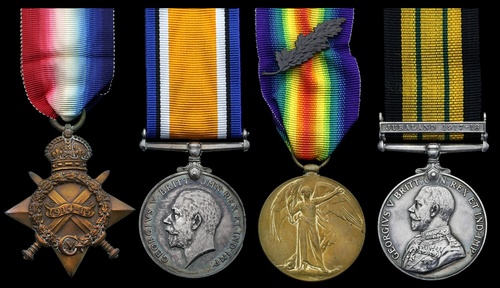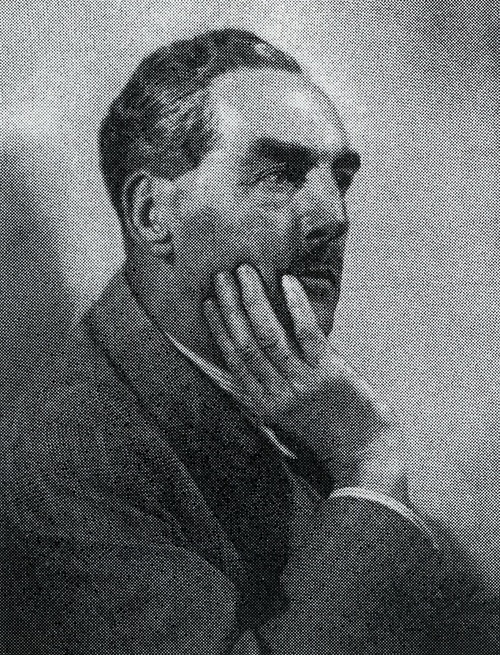Auction: 19003 - Orders, Decorations and Medals
Lot: 216
An outstanding Great War and Jubaland 1917-18 operations campaign group of four awarded to Lieutenant E. M. Ritchie, King's African Rifles, late Botha's Bodyguard
Having seen extensive action in the Maritz rebellion and German South-West Africa operations of 1914-15 - a story retold in the pages of his 1915 publication With Botha in the Field - Ritchie played a prominent part in the Jubaland operations of 1917-18, gaining a 'mention' for his spirited actions in several notable night attacks and bayonet charges
1914-15 Star (L./Cpl. E. M. Ritchie, G.O.C. Bdy. Gd.); British War and Victory Medals (Lieut. E. M. Ritchie); Africa General Service 1902-56, 1 clasp, Jubaland 1917-18 (Lieut. E. M. Ritchie, 5-K.A. Rif.), generally good very fine (4)
Eric Moore Ritchie was born at Bebington, Cheshire on 9 November 1887, the son of a Scottish diplomat. Educated at George Watson's College in Edinburgh, he may also have attended Fettes.
Perhaps on account of one of his father's postings, he lived for several years in South Africa, where he joined the British South Africa Police (B.S.A.P.) in August 1910 and was likewise employed on the outbreak of hostilities.
Opening shots - the Maritz Rebellion and German South-West Africa
In October 1914, it was decided to form a Bodyguard for General Botha, drawn of volunteers from the ranks of the B.S.A.P., and Ritchie was among them, reporting to Pretoria. And he was quickly employed in countering the Maritz rebellion, participating in the engagement against the rebel leader Jopie Fourie at Nooitgedacht on 16 December 1914. It was his first time in action and, by his own account, 'an extremely dirty affair'; With Botha in the Field (Longmans, Green & Co., London, 1915), refers.
His entertaining account of the rebellion aside, Ritchie's book also refers to his subsequent part in the German South-West Africa campaign of 1914-15. Of the aforementioned action at Nooitgedacht, he describes how a Boer War veteran told him it was 'the hottest corner he had ever been in', a fact not lost on the budding author who endured 'wicked coughs of rifle fire' that later caused him nightmares:
'The worst of rifle fire is that you can hear bullets whizzing and spitting in trees, but it takes an experienced hand to divine direction … I saw a man who had shared a last cigarette with me as he rode into the action that afternoon lying dead on a blanket three hours later … loyalist casualties in this action were 12 killed and 24 wounded.'
Gunfire - and mounting casualties - were to remain to the fore over the coming months, as Ritchie and fellow members of the Bodyguard became embroiled in the German South-West Africa campaign. By way of example, the actions fought by Botha on the Pforte-Jakalswater-Riet front in March 1915, resulted in the loss of 15 killed, 39 wounded and 42 missing; see With Botha in the Field for further details and Ritchie's lively commentary on all aspects of the campaign.
Accompanying research - drawn from official records - refers to him having resigned from the B.S.A.P. following the occupation of Windhuk in May 1915, in order 'to proceed to Europe'; meanwhile, he gained employment as Editor of Nonquai, the African Services Journal.
In March 1916, Ritchie applied for a temporary commission and - via a nominal appointment in the 3rd Reserve Cavalry - he was posted as a Lieutenant to the 1/5th King's African Rifles (K.A.R.).
To Jubaland with the K.A.R.
His subsequent tour of active duty was prompted by ongoing local troubles following the murder of Francis Elliott, 'a tall, thin ex-police officer' and the District Commissioner at Serenli, in Jubaland; Elliott - together with 35 African policemen and 50 villagers - was cut down by rebel tribesmen under the Aulihan Sheikh, Haji Abdurrhaman Mursal.
Emboldened by his capture of Serenli in February 1916, Mursal mounted further raids throughout the year, so much so that a decision was made to raise a new battalion of the K.A.R. to counter the threat; hence the formation of the 1/5th K.A.R.
The ensuing operations in Jubaland lasted from July 1917 until March 1918 and Ritchie played a prominent role in them, winning a well-merited mention in despatches (London Gazette 6 August 1918, refers). The story of the expedition is best described in the official report written by the senior officer, Major Porcelli, in March 1918, in which he refers to the good work undertaken by Ritchie.
Among other actions, he was present in the successful attack on Hagagabli on the night of 25-26 December 1917. Keith Steward, in his article 'Mentioned in Despatches for Jubaland 1917-18' - see the O.M.R.S. Journal, March 2003 - takes up the story:
'On the night of 25-26 December, Captain Martin and Lieutenants Ritchie and Erskine, with 90 rank and file of the Mounted Infantry Company and one Lewis gun, left Malkaadi and set out for Hagagabli. The rest of the column, consisting of Captains Osborn and Welsh, Lieutenant Henry, Native Officer Ahmed and 120 Somalis from C and E Companies, followed with the transport camels at dawn on the 26th. At 2.30 a.m. an enemy picquet fired on Captain Martin's column and shortly afterwards attacked on both flanks. Unencumbered by camels, the small force was able to deploy with great flexibility. Lieutenant Erskine had devised a fitting which, when attached to the mule saddle, enabled a Lewis gun to be brought into action in seconds, rather than minutes. A steady fire was maintained until dawn, when Captain Martin ordered a bayonet charge and the tribesmen fled. The small K.A.R. force had been lucky as, although they were heavily outnumbered, the Aulihan rifle fire had been wild and high. It showed once again that casualties could be avoided when troops laid down and fired from the forward prone position … '
A few days later, Ritchie participated in a bayonet charge against the rebel tribesmen at Hafanli and, in an attack against the rebel leader Rer Afgab in late January 1917, his force of 40 men destroyed 20 villages and captured 1,400 camels. He was mentioned in despatches.
Postscript
In civilian life, Ritchie appears to have become a journalist. He also went on to publish further books, among them The Unfinished War, an account of Anglo-German conflict in South Africa (Eyre & Spottiswoode, London, 1940); sold with a large file of copied research, including official correspondence and reports.
Subject to 20% VAT on Buyer’s Premium. For more information please view Terms and Conditions for Buyers.
Sold for
£1,600
Starting price
£420







